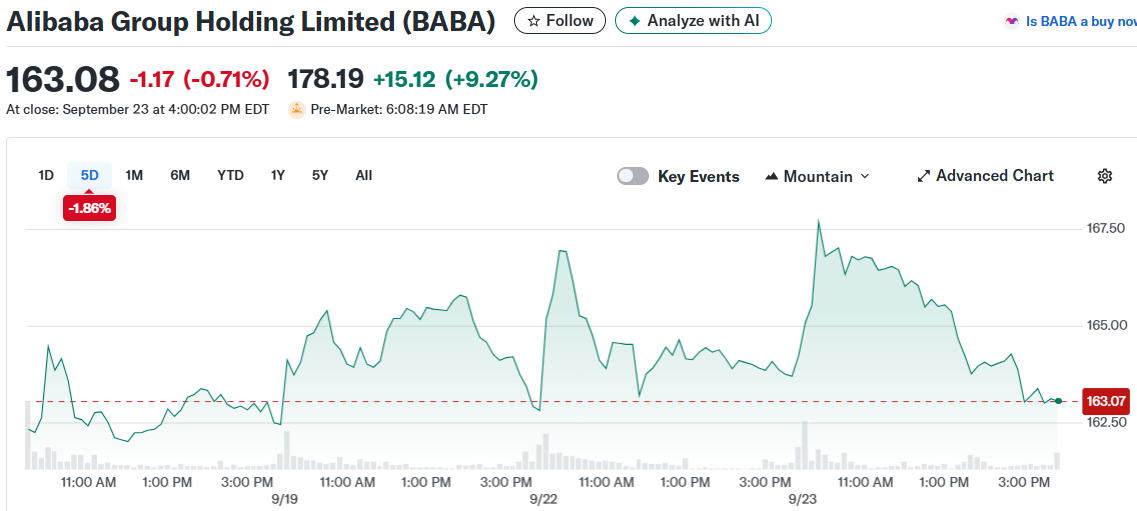TLDR
- Alibaba stock surged 9.7% to 4-year highs after CEO Eddie Wu announced plans to increase AI investment beyond existing $53 billion commitment
- Company unveiled Qwen3-Max large language model and new AI product suite at annual cloud technology conference in Hangzhou
- Wu projects global AI spending will reach $4 trillion over next five years as tech companies compete for breakthrough technologies
- Alibaba Cloud plans first data centers in Brazil, France, Netherlands with additional locations in Mexico, Japan, South Korea, Malaysia, Dubai
- Stock has doubled this year with cloud division showing triple-digit AI product growth and 26% sales increase
Alibaba Group stock jumped to its highest level in nearly four years Wednesday after CEO Eddie Wu announced expanded artificial intelligence spending plans. BABA shares rose 9.7% in Hong Kong trading and gained 9.3% in US premarket sessions.

Wu revealed the Chinese tech giant will increase AI investment beyond its February commitment of 380 billion yuan ($53 billion) over three years. The announcement came at Alibaba Cloud’s annual flagship technology conference in Hangzhou.
The CEO expects global AI investment to reach $4 trillion over the next five years. Alibaba must keep pace with this massive spending race, Wu explained during his presentation.
“The industry’s development speed far exceeded what we expected, and the industry’s demand for AI infrastructure also far exceeded our anticipation,” Wu told conference attendees. “We are actively proceeding with the 380 billion investment in AI infrastructure, and plan to add more.”
Alibaba’s Hong Kong-listed shares hit their highest point since 2021. Year-to-date gains topped 107%. The stock surge reflects continued investor appetite for AI spending announcements across tech companies.
New AI Products Drive Cloud Growth
Alibaba officially unveiled its Qwen3-Max large language model at the conference. This latest version represents the company’s answer to competing AI systems from rivals Tencent, Baidu, and other Chinese tech giants.
Wu positioned Alibaba Cloud as a “full-stack AI service provider” delivering computing power for training and deploying large AI models. The cloud division posted 26% sales growth last quarter, making it Alibaba’s fastest-growing business unit.
AI-related products showed triple-digit growth during the recent quarter. This strong performance helped drive the stock’s impressive year-to-date rally.
Alibaba Cloud announced plans to launch its first data centers in Brazil, France, and the Netherlands within the coming year. Additional centers will open in Mexico, Japan, South Korea, Malaysia, and Dubai next year as part of the global expansion strategy.
Chip Strategy Addresses US Export Controls
The company faces challenges accessing Nvidia’s advanced AI processors due to US export controls on technology exports to China. Alibaba is developing hardware innovations including its own chips and faster computing systems.
Wu discussed the company’s semiconductor efforts during the conference presentation. Alibaba’s T-Head semiconductor unit recently secured China Unicom as a customer for its AI accelerators, according to Chinese state media reports.
Alibaba revealed it’s integrating Nvidia’s development tools for physical AI applications into its cloud platform. This integration gives clients access to tools for building services targeting robots and autonomous vehicles.
Beijing continues pushing Chinese firms to reduce dependence on US chip suppliers. The Chinese government recently urged companies to avoid using Nvidia’s RTX Pro 6000D graphics cards that can be repurposed for AI applications.
Bloomberg Intelligence analysts noted the increased AI spending may not generate meaningful financial returns in the near term. Alibaba’s free cash flow turned negative at $2.6 billion as capital spending more than tripled to $5.4 billion last quarter.
Chinese tech giants including Tencent, Baidu, and JD.com are pouring record sums into AI development. Bloomberg Intelligence estimates these four companies could spend over $32 billion on AI infrastructure and services in 2025 alone, up from under $13 billion in 2023.
Wu announced the expanded AI investment plans and new product launches at Wednesday’s technology conference in Hangzhou.





